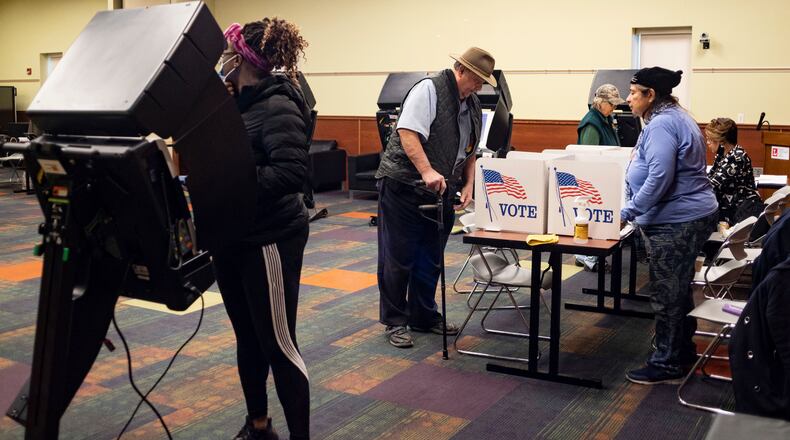That includes one U.S. Senate seat, all 15 U.S. House seats, governor, lieutenant governor, secretary of state, attorney general, state auditor and three state supreme court justices.
Also on the statewide ballot will be two proposed constitutional amendments. One would formally prohibit noncitizens from voting in state or local elections. The other would remove language that allows bail on “sufficient sureties,” saying instead that in setting bail courts must consider public safety, the person’s criminal record, the likelihood they’d flee, and seriousness of their offense.
Former U.S. Rep. Tim Ryan and author J.D. Vance are respectively the Democrat and Republican seeking to replace retiring Republican Sen. Rob Portman.
Voters in the Miami Valley will choose their congressman in one of four districts:
• The 1st, where Republican incumbent Steve Chabot faces Democrat Greg Landsman;
• The 8th, where Republican incumbent Warren Davidson meets Democrat Vanessa Enoch;
• The 10th, in which Republican incumbent Mike Turner faces Democrat David Esrati; and
• The 15th, where Republican incumbent Mike Carey is running against Democrat Gary Josephson and independent Elizabeth McKenzie.
For governor, incumbent Republican Mike DeWine is running against Democratic nominee Nan Whaley, former mayor of Dayton; and independent write-in candidate Tim Grady.
Republican incumbent Secretary of State Frank LaRose is challenged by Democrat Chelsea Clark. Terpsehore “Tore” Maras will appear on the ballot as an “unaffiliated” candidate for secretary of state. She sought to run as a Republican but failed to get enough valid signatures on her nominating petition.
Attorney General Dave Yost, the Republican incumbent, will face Democrat Jeff Crossman; while Republican incumbent Keith Faber will square off with Democrat Taylor Sappington for state auditor.
Key dates
Sept. 23: Ballots for active-duty military and overseas voters must be ready.
Oct. 11: Voter registration deadline for the Nov. 8 election.
Oct. 12: Counties must have regular absentee ballots ready to send out; in-person early voting begins.
Nov. 5: Applications for absentee ballots must be received by noon at county boards of election.
Nov. 7: Absentee ballots mailed to boards of election must be postmarked by this date. End of in-person early voting.
Nov. 8: Polls are open from 6:30 a.m. to 7:30 p.m. Absentee ballots returned by a method other than U.S. mail must arrive by the time polls close.
Nov. 18: Absentee ballots returned by mail must be received by boards of election. So must overseas and military ballots.
Voting information
The Ohio Secretary of State’s office will mail applications for absentee ballots to all registered voters, probably around Labor Day. Newly-registered voters can request absentee ballots from their county boards of election. Completed ballots should be mailed back to county election offices.
People can register to vote online through their county board of elections website or at www.olvr.ohiosos.gov. To register online people need to provide their name, date of birth, address, an need Ohio driver’s license or ID card, and the last four digits of their Social Security number.
People can also register in person at their county board of elections office, libraries, public offices, driver’s license bureaus and public high schools.
About the Author

